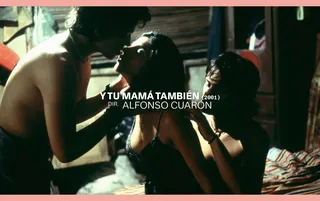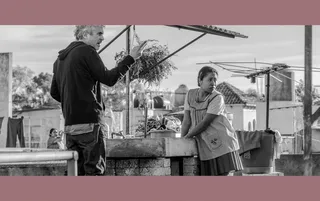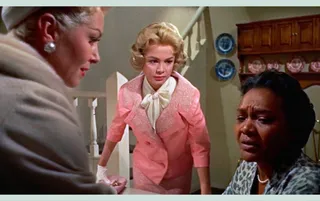Alfonso Cuarón's Melodrama
By Tim Murphy
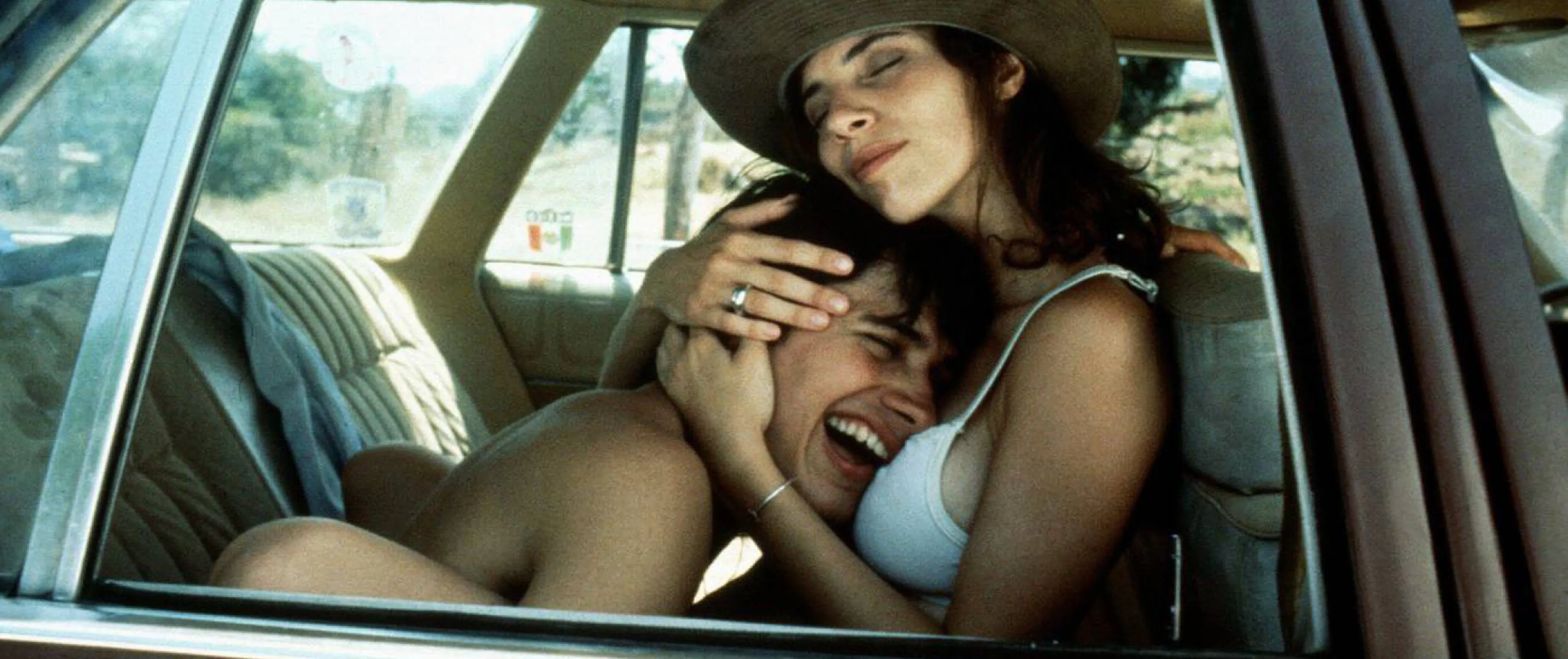
Y tu mamá también, dir. Alfonso Cuarón, 2001
Alfonso Cuarón’s Melodrama
Romance? Yes. Social critique? Absolutely. But the beating heart of the director’s Y tu mamá también and Roma is unabashed high emotion
By Tim Murphy
June 3, 2024
Late in Y tu mamá también, Mexican filmmaker Alfonso Cuarón’s multilayered 2001 road trip epic, we meet the characters of Chuy and Mabel, a good-natured coastal-Oaxacan fisherman and his wife. Shortly after the film’s protagonist trio of Tenoch (Diego Luna), Julio (Gael García Bernal) and Luisa (Maribel Verdú) discover one of the paradisiacal beaches they’ve set off from Mexico City to explore, the fisherman couple and their young children appear almost magically in a motorboat out at sea, as though one with the unspoiled beauty that surrounds and sustains them. The family quickly wraps the tempestuous, citified trio in warmth, Chuy ferrying them to various enchanted coves while Mabel welcomes Luisa’s help with her children. This is Cuarón at his most romantic, summoning all his considerable screenwriting and cinematographic powers to create a heart-affirming beachside idyll.
From left: Gael García Bernal and Diego Luna in Y tu mamá también; Luna, Maribel Verdú and Bernal in Y tu mamá también
Harsh political and social reality soon intrudes. Not for the first time in the film, the diegetic sound cuts out, replaced by a somber male voice-over that intermittently narrates various characters’ innermost thoughts and foretells their bleak futures. In this instance we learn that the development of a nearby luxury resort will rob Chuy and Mabel of their proudly self-sufficient seafaring life. Then the voice-over goes from grim to downright tragic: We learn that Chuy will end up toiling as a janitor at the resort and never fish again. (“No!” we want to cry. “Not fair!”)
The scene functions as a kind of microcosm of the tonal tensions in both Y tu mamá también and Cuarón’s later opus Roma, the 2018 black-and-white epic of seismic class and political currents in early-1970s Mexico City. The latter film is told through the silently expressive, watchful eyes of Cleo (Yalitza Aparicio), an indigenous young maid in a bourgeois household in the handsome neighborhood of the film’s title. Cuarón, a bankable Hollywood powerhouse, has made his share of splashier fare, including 2006’s Children of Men and 2013’s Gravity, but Y tu mamá también and Roma are worth singling out. These films are set in his very own raucous and beloved hometown. Curiously, both films toggle uneasily between romance and social critique. But ultimately it’s romance’s far more volatile sister, melodrama, that makes them such profoundly lasting works of art.

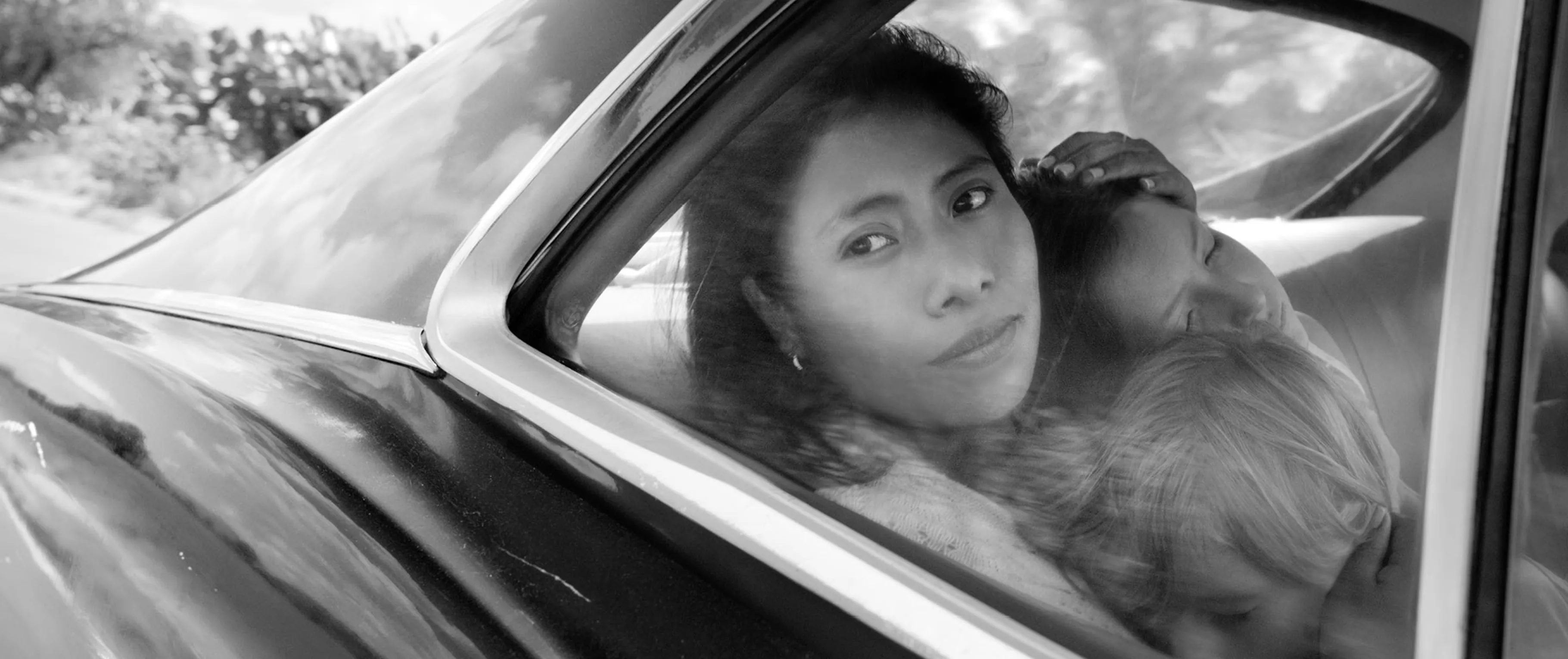
Roma, dir. Alfonso Cuarón, 2018
Done well, melodrama heightens everyday events and feelings to elicit unbearable emotion in the viewer, both visceral and Pavlovian to the point that they want to intervene and stop or mitigate onscreen suffering. It’s Cuarón’s masterful manipulation of emotional breaking points that confers these two films their power. We might not instantly think of the pioneering poet of melodrama, the director Douglas Sirk, when we watch these films—they are so different from Sirk in almost every possible way—but the excess of pathos is Sirkian Hollywood at its core.
Both films open with extended sensual visions. Y tu mamá también kicks off with a handheld camera as jittery as a horny adolescent, its blunt opening shots of two sets of teenagers (Tenoch and Julio, with their respective girlfriends) fucking with wild, youthful abandon. Roma, in contrast, begins with a far more meditative tone, with a static and seemingly interminable shot of soapy water waves running over courtyard tiles, from which the camera pulls back to reveal Cleo as she scrubs her employers’ gated driveway of dogshit. These entrances signal Cuarón’s romantic obsession with the tactile details of daily life in a social setting he clearly deeply loves. In a sense, both films allow him to luxuriate in the entire sweep of Mexican society, from his sly indictments of the corrupt and smug European-descended upper class to his adoring depiction of the indigenous working class (albeit, a depiction some critics have found condescending).
Y tu mamá también’s action-packed road trip serves to showcase the beauty of the country, the camera lens a proxy for Cuarón’s own eyes, starry with Proustian sentimentality. The chickens and cows that choke the dusty rural roads, the simple generosity of the campesinos that the trio meets along the way, and the rustic warmth of the film’s myriad country cantinas and fonditas all contribute to this infatuation. Roma, meanwhile, with its lingering wide shots of country and coast, is as madly in love with Mexico and Mexicans as its precursor.
But Cuarón is too smart to merely give us romance. Y tu mamá también is relentlessly attuned to the material hardship of Mexico’s rural classes and the monstrosities of its ruling classes. At one point the ever-deadpan voice-over notes that the Mexican president denies government involvement in a massacre of poor people, and later that day, “flies to Seattle for a world summit on globalization.”
“It’s Cuarón’s masterful manipulation of emotional breaking points that confers these two films their power.”
In other words, the messaging is not subtle. But it makes clear that Cuarón won’t let us—or perhaps more so, himself—remain in a swoon indefinitely. Roma, similarly, doesn’t hide the near-indentured drudgery and indignities of Cleo’s life. She never quite knows when the equally man-abandoned Sofía (Marina de Tavira), her employer, will treat her with love and kindness or when she will viciously snap at her. The recurring image in the film that never lets us forget that Cleo will likely spend the rest of her life in the muck of servitude is the dogshit littering the courtyard, which will need cleaning up as long as the family dog, Borras, is alive.
In their detached and sometimes documentary-like cinematography, Y tu mamá también and Roma both seem to bear the influence of the post-’60s New Wave. Less obvious is Cuarón’s (perhaps unconscious) debt to Sirk, whose 1950s films are driven by his female characters’ duress and physical suffering—Jane Wyman’s blindness in the implausibly plotted Magnificent Obsession (1954) and Juanita Moore and Susan Kohner’s race-driven mother-daughter anguish in 1959’s tear-jerker Imitation of Life. (Was Cuarón thinking about Imitation of Life as he wrote Roma? Both limn the deep but fraught survival bond formed between a strong-willed single white mother and her saintly, stoic female housekeeper of color.)
Of course Cuarón doesn’t employ Sirk’s anguished close-ups and engorged orchestration, now recognized as camp artifacts of a bygone age. Rather, Cuarón’s camera is dispassionate, his lack of emotion-cueing music sufficiently art-house. But beneath the deadpan surface are the shameless workings of melodrama.
From left: Magnificent Obsession, dir. Douglas Sirk, 1954; 1970s Mexico Ciry in Roma
Early in Y tu mamá también, we are given coy clues that the beautiful and spirited Luisa is dying. What is more melodramatic than a beautiful and spirited character dying young? Then the entire movie builds, with canny breadcrumbs dropped along the way, to its famously breathless climax, when Tenoch and Julio finally make love, blindly drunk and buffered by the presence of Luisa.
After that climactic scene, we learn, when Tenoch and Julio meet up for an awkward coffee, that Luisa has died—a crushing revelation even if we intuited its arrival. Many lovers of Y tu mamá también are haunted by its quietly devastating final scene: Tenoch and Julio—studying at different universities in the city, their mythic and consequential road trip well behind them—sit in a diner, discuss the death of Luisa with a kind of dazed disbelief and then feebly part ways. It’s the last line of the voice-over that brings down melodrama’s sledgehammer: “They will never meet again.” How likely is it that two friends who grew up in the same social network, even amid class disparities, will never see each other again while living in the same city? It doesn’t matter. The line drops with thudding emotional finality.
From left: Alfonso Cuarón and Yalitza Aparicio on the set of Roma; Imitation of Life, dir. Douglas Sirk, 1959
Roma has us watch Cleo stand there, silently humiliated, as the loutish young man with whom she thought she might raise a child shouts at her to get out of his life, dismissing her as a “servant.” Then we witness her—in an almost sadistically prolonged, static lateral shot—weep in the hospital as her stillborn baby is nearly pried from her hands and wrapped unceremoniously in white cloth for disposal. No one is at her side to comfort her. As with Luisa in Y tu mamá también, we feel so intensely—so wretchedly—for Cleo that we want to step into the frame and hold her.
Much like Y tu mamá también, Roma builds shrewdly to its wildly melodramatic peak, perhaps the most powerful scene Cuarón has ever conjured, filmed in one unbroken lateral shot. Not only does Cleo, who can’t swim, venture into the ocean to save two children she’s paid to care for but has grown to love, the trio then stumbles together back up to the sand and collapses, where they are swiftly met by Sofía and the other children. All of them crying, clutching each other on the sand, Cleo finally expels a shameful truth: She didn’t want her baby to live. “We love you, Cleo, we love you so, so much,” cry Sofía and the children. Watching this scene, how can we not melt with that particular kind of viewer’s anguish that actually feels good, reassuring us of our own compassion?
In the subsequent scenes, Cuarón tries to bring us back down to earth. When the family is home again, the children shower praise on Cleo’s heroism in virtually the same breath they ask her to bring them snacks. She may be part of the family, but she’s still the help.
No matter. That grounded ending is no match for the beachside rescue scene that preceded it. Like Annie’s funeral at the end of Imitation of Life, a spectacular set piece during which her prodigal daughter, Sarah Jane, throws herself on the casket sobbing, it lands too deeply, with too much unbearable pathos,to be trumped by Cuarón’s carefully ambiguous closing notes.

